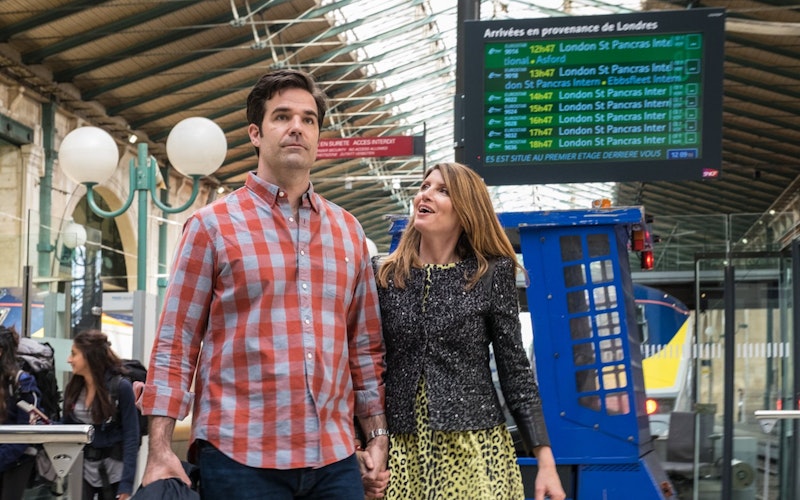
TV
Catastrophe’s Refreshingly Ancient Take on Marriage
If you haven’t seen Catastrophe, a British sitcom available on Amazon, consider this article a cautious encouragement to check it out. Fair warning, though: if you are generally opposed to bawdy body humor, unambiguous adult content, and recurring sexual situations, you should probably stay away. (So Mom, if you’re reading this, don’t watch Catastrophe.)
Rob Delaney and Sharon Horgan write and star in the series, which is unapologetically and often crudely about sex. It’s sex that brought the two strangers together while Rob, an American, spends a week on business in London and meets Sharon, from Ireland, at a bar. They spend six days together, assuming they’ll never see each other again. But the affair leads to an unplanned pregnancy. What happens next is where the show progresses from gratuitous to gratifying. Sharon wants to keep the baby. Rob wants to keep the baby and marry Sharon. From this point forward, they manage to tell a contemporary story about the ancient idea of married love between one man and one woman with a lot of humor, a lot of suffering, and a lot of ridiculously ordinary affection.
I first heard about Catastrophe, curiously enough, from Eloise Blondiau’s positive review in a Jesuit publication. Blondiau describes an important scene in the final episode of the first season. It’s the honeymoon night, where Rob’s romantic overture toward the eight-months-pregnant Sharon involves—wait for it—an offer to trim the toenails on her exhausted feet. The review had me at “toenails.” This is a scenario I find far more relatable in my 27 years of married love than almost any other televised intimacy between a husband and a wife I can recall. The fact that the scene ends not in an embrace but an argument only added to its credibility.
The origin of the word passion is found in the same meaning as suffering.
I’ve been sleeping with one man for the past 27 years and despite what some evangelical slogans might have you believe, sex with my husband hasn’t always been a thrill a minute, let alone a reenactment of the Spirit-inspired eros found in Song of Solomon. For all its crudity, Catastrophe does a better job than any rom-com I’ve ever seen evoking my laughs of recognition. In sickness and health, for richer or poorer, through arguments, dysfunctional extended families, parenting chaos, and various crisis in their community of friends, Rob and Sharon fight to be together in every way possible, especially in bed.
This mutual desire fuels my new, all-time favorite romantic line. Rob and Sharon are lying in bed at the end of the day, arguing about what it means to live together sexually when everything in their lives seems to conspire against them. They’ve been doubting their ability to please each other and to maintain the kind of relationship the rest of their single, kid-less friends seem to be living. It feels like the script will take the predictable turn (based not only on the average screenplay, but on the real-life splits happening every day). They’ll either separate or just live parallel lives while finding sexual fulfillment in other places.
And then, there is this exchange:
“Are we sexually incompatible now?”
“No, we're just stressed ... and tired.”
“OK ... because I still fancy you.”
“I very fancy you.”
And that’s the kind of married romance we hardly ever see on television.
A few years back, I was working at a marketing agency in downtown Austin, Texas. In a work culture actively recruiting young professionals, I was in the minority with my silver hair and the worn-down wedding band I’d been wearing longer than most of my co-workers had been alive. One of the conversations that came up frequently during happy hour was “how to keep passion alive” when you’re in a long-term relationship. No one could quite figure out how commitment and passion could be compatible. Eventually, they’d respectfully invite me into the conversation. “Don’t you ever feel trapped?” they asked.
Over margaritas, I’d remind them that the origin of the word passion is found in the same meaning as suffering, intense suffering, as in the passion of Christ. More than one friend responded that they were looking for that kind of relationship—one that grew closer in hard times and even allowed for personal sacrifice for the good of the other. I’d tell them, in that sense, my marriage is full of passion. And that if by trapped they meant “safe, secure, gloriously comfortable” then, yes, I feel trapped all the time. “Monogamy is the new sexy,” I’d say.
To their credit these young urbanites looked at me with a bit of respect after that, but my discreet reference to the joys of married sex was a small gesture in the face of decades of cinematic, photo-shopped sex that had already formed their imaginations with a truncated view of passion. They’d been entertained by every possible scenario other than intense, exhausting, ordinary, ridiculous married sex.
Writing at Christianity Today, W. David O. Taylor asked, “Where Are All the Good Stories About Marriage?” He argued that “while movies and television cannot be blamed exclusively for our society’s rejection of theologically conservative ideas about marriage, they have certainly made it easier for our neighbors to imagine that such a marriage, especially its exclusive status, is impossible or undesirable. I also contend that we have not fully reckoned with the power of the artistic imagination.” Along with the few excellent television shows he mentions to better form a view of marriage, I’d like to nominate Catastrophe, in all its bawdy, explicit, cringe-inducing glory.
Topics: TV, Culture At Large, Arts & Leisure